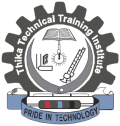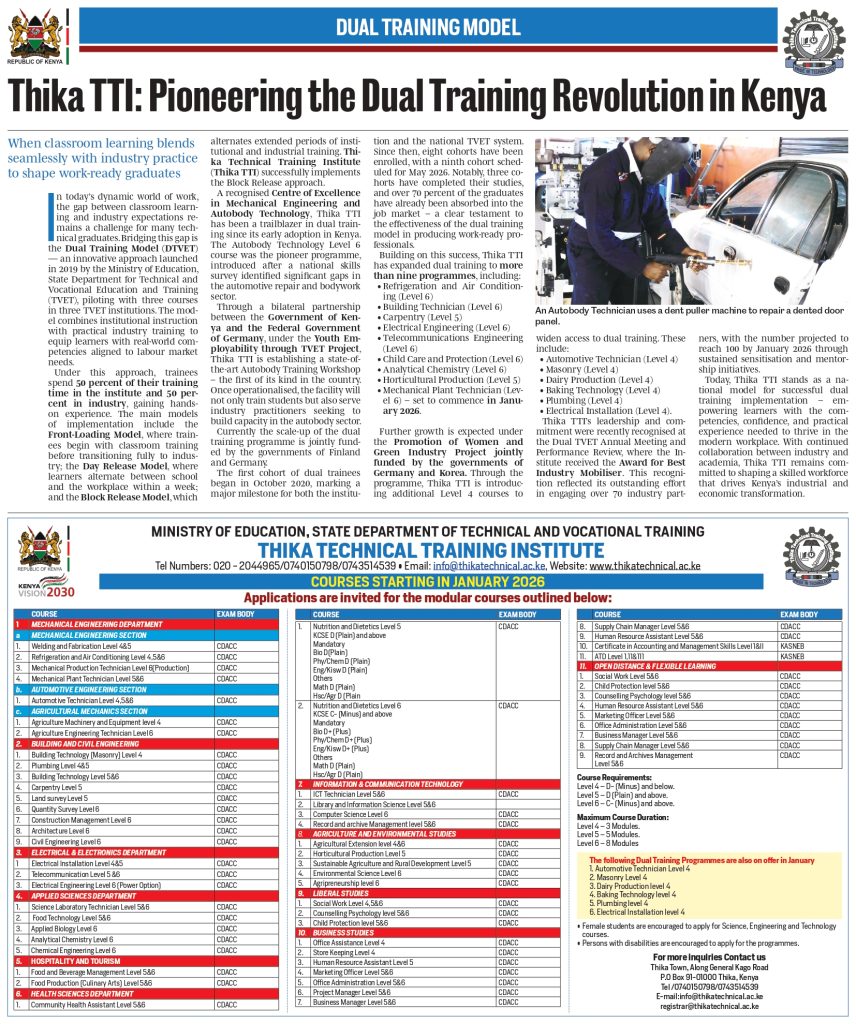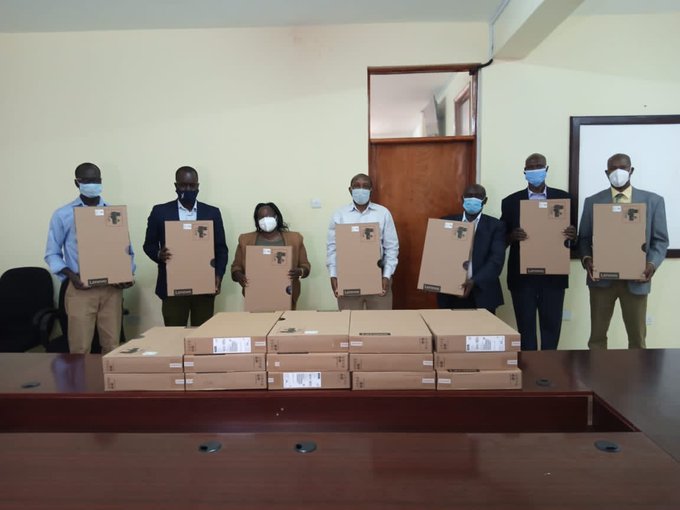The Dual Training Model (DTVET): Bridging Academia and Industry at Thika TTI
In the dynamic landscape of modern employment, bridging the gap between classroom learning and real-world industry expectations remains a critical challenge for technical graduates. The Dual Training Model (DTVET), an innovative and structured approach, directly addresses this need by equipping learners with job-market-aligned competencies. Launched in 2019 by the Ministry of Education, State Department for Technical and Vocational Education and Training (TVET), the DTVET model strategically combines institutional instruction with practical, hands-on industry training.
Structure of the Dual Training Model
Under the DTVET approach, trainees are required to split their training time equally: 50 percent in the training institute and 50 percent within a collaborating industry partner. This balanced exposure ensures learners gain essential hands-on experience and develop work-ready skills.
The main models of implementation piloted nationally include:
- Front-Loading Model: Trainees begin with extended institutional training before transitioning fully to the industrial phase.
- Day Release Model: Learners alternate between the institute and the workplace within the training week.
- Block Release Model: Extended, alternating periods are spent in institutional training and industrial practice.
Thika Technical Training Institute (Thika TTI) successfully implements the Block Release Model to facilitate comprehensive institutional and industrial exposure.
A National Centre of Excellence in Dual Training
As a recognized Centre of Excellence in Mechanical Engineering and Autobody Technology, Thika TTI has been a trailblazer in the early adoption and successful implementation of dual training in Kenya. The Autobody Technology Level 6 course served as the pioneer programme, introduced following a national skills survey that identified significant competency gaps in the automotive repair and bodywork sector.
Strategic Partnerships and Infrastructure
Thika TTI’s commitment to excellence is supported by robust international cooperation. Through a bilateral partnership between the Government of Kenya and the Federal Government of Germany, under the Youth Employability through TVET Project, Thika TTI is establishing a state-of-the-art Autobody Training Workshop the first of its kind in the country. This facility will not only serve enrolled students but also provide crucial capacity building for industry practitioners. Current scale-up of the dual training programme is jointly funded by the governments of Finland and Germany.
Proven Impact and Expansion
The first cohort of dual trainees commenced in October 2020, marking a major milestone for both the institution and the national TVET system.
- Enrollment: To date, eight cohorts have been enrolled, with a ninth scheduled for May 2026.
- Graduate Success: Three cohorts have successfully completed their studies, with over 70 percent of graduates already absorbed into the job market. This high absorption rate is a clear testament to the effectiveness of the DTVET model in producing work-ready professionals.
Expanded Dual Training Programmes
Building on this foundational success, Thika TTI has expanded the Dual Training Model to include more than nine programmes:
- Refrigeration and Air Conditioning (Level 6)
- Telecommunications Engineering (Level 6)
- Building Technician (Level 6)
- Child Care and Protection (Level 6)
- Carpentry (Level 5)
- Analytical Chemistry (Level 6)
- Electrical Engineering (Level 6)
- Horticultural Production (Level 5)
- Mechanical Plant Technician (Level 6) – Commencing January 2026
Further growth is anticipated under the Promotion of Women and Green Industry Project, jointly funded by the governments of Germany and Korea. This initiative is introducing additional Level 4 courses to widen access to dual training, including:
- Automotive Technician (Level 4)
- Masonry (Level 4)
- Dairy Production (Level 4)
- Baking Technology (Level 4)
- Plumbing (Level 4)
- Electrical Installation (Level 4)
Recognition and Future Commitment
Thika TTI’s leadership and robust commitment were recently recognised at the Dual TVET Annual Meeting and Performance Review, where the Institute received the Award for Best Industry Mobiliser. This award reflects the institute’s outstanding effort in engaging over 70 industry partners, with projections to reach 100 by January 2026 through sustained sensitisation and mentorship initiatives.
Today, Thika TTI stands as a national model for successful dual training implementation empowering learners with the competencies, confidence, and practical experience needed to thrive in the modern workplace. Through continued, strong collaboration between industry and academia, Thika TTI remains committed to shaping a skilled workforce that drives Kenya’s industrial and economic transformation.



